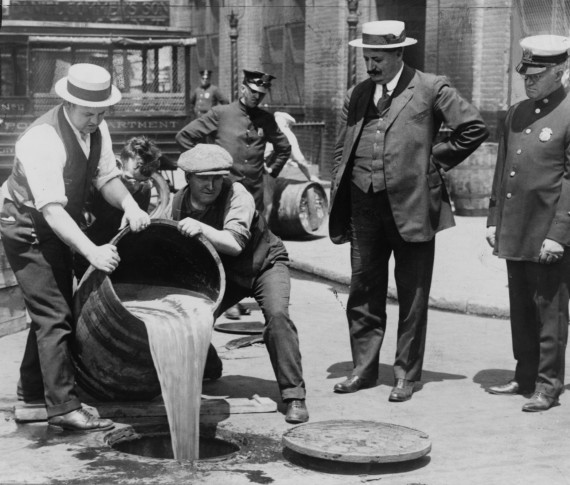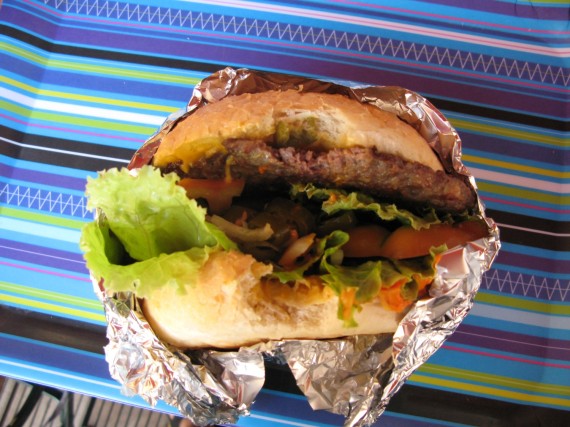
New York City Deputy Police Commissioner John A. Leach, right, watching agents pour liquor into sewer following a raid during the height of prohibition
The following was adapted from the Improvement Era magazine of October 1911.
Utah Gains House Member
Congress at the extra session passed the Congressional Reapportionment Bill, fixing the future House membership at 433 instead of the present 391. It provides for increased representation according to population, without reducing the membership from any state. This gives Utah one more member.
Before adjournment on Tuesday, 22nd August, Congress also passed the Campaign Publicity Bill, requiring the publication of all campaign contributions and expenses before elections.
A bill admitting Arizona and New Mexico was passed and signed by President Taft, so that these states will now enter the Union under certain conditions.
Among the big results of the extra session was the passing of the Canadian Reciprocity Bill.
[The number of seats in the House of Representatives is 435, and has been since 1913. Utah gained its first seat after the 1900 census, effected in 1903. The second seat was effected in 1913, after the 1910 census. After the 1980 census, Utah gained its third seat, effective in 1983. The 2010 census gave Utah its fourth congressional member.]
Canadian Reciprocity
Reciprocity suffered an overwhelming defeat in the Canadian elections held on September 21. The Liberal Party under Sir Wilfred Laurier led the fight for reciprocity, while the Conservative party, under R. L. Borden, led the opposition which won a decisive victory over the government, gaining a majority in Parliament of over fifty.
Borden will soon become the Prime Minister of Canada, and Sir Laurier will retire. The result of the election will be that the Fielding-Knox reciprocity agreement passed by the late extra session of the United States Congress will not be presented to the twelfth Canadian Parliament, which meets in October, and closer commercial relations between Canada and the United States will not be possible perhaps for years to come.
The Conservatives are committed to a closed door against the United States, and to a policy of trade-expansion within the [British] empire. President Taft was greatly disappointed at the result and believes the “annexation bogy” had much to do with the defeat of the measure in Canada.
[From 1867 to 1911, regaining reciprocity was an aim of all Canadian governments. The Conservative party, which stood publicly for nationalism and protectionism, succeeded in associating the Liberals with free trade, commercial union with the U.S., and continentalism, which smacked of absorption by the U.S.
From 1935-1980, a number of bilateral trade agreements greatly reduced tariffs in both nations.
Canada and the United States on October 4, 1988 signed The Free Trade Agreement (FTA). The agreement removed several trade restrictions in stages over a ten year period. With the addition of Mexico in 1994 FTA was superseded by the North American Free Trade Agreement (NAFTA).]
The Liquor Question
The local election held in Bannock county on Wednesday, September 6th resulted in a victory for prohibition, and the county went dry by a majority of over 700.
The vote of a few of the leading towns are as follows: Pocatello, wet by a majority of 568; Soda Springs, dry 129, wet 116; Grace, dry 209, wet 44; Bancroft, dry 242, wet 44; Thatcher dry 176, wet 18.
[Idahoans approved state-wide prohibition in 1916. They ratified National Prohibition in January 8, 1919. It was widely believed that prohibiting alcohol would reduce crime, improve health, raise morality, and protect young people.
There was a strong demand for alcohol, and illegal operators quickly moved in to supply that demand. In order to operate, illegal alcohol producers and distributors routinely bribed law enforcement officers and others. Sometimes law enforcement officers themselves were directly involved in moonshining and bootlegging.
Those who couldn’t be bought off were sometimes threatened and intimidated. The frequent revelations of corruption turned many against Prohibition and lowered respect for law. Residents became increasingly concerned over problems created by Prohibition.
On October 17, 1933, by a vote of nearly 60%, Idaho called for the repeal of National Prohibition. Source: National Prohibition and Repeal in Idaho.]
Adapted from: “Passing Events”, Improvement Era, Vol. XIV. October, 1911. No. 12.
Photo Credit: Library of Congress

